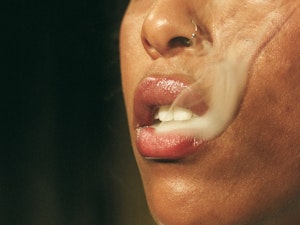
Herb
If you’ve seen THCa products online or at your local smoke shop, you might be wondering: is THCa real weed?
The short answer is yes—THCa (tetrahydrocannabinolic acid) is a natural cannabinoid that exists in raw cannabis plants. In fact, all cannabis contains THCa in its natural state. But why are so many companies in the cannabis industry specifically selling this cannabinoid instead of Delta-9 THC flower? The answer is simpler than you think.
So, what is THCa flower, and how does it compare to “real” cannabis plants? Let’s find out.
Real Weed Contains THCa—So Why The Confusion?

The confusion around THCa often comes down to its chemistry. Because it’s not technically Delta-9 THC—the primary psychoactive compound in cannabis—some people assume it’s not “real weed.”
In cannabis plants, THC actually begins as THCa, which contains a carboxylic acid group in its molecular structure. This version of the molecule is non-psychoactive, which is why raw cannabis doesn’t get you high.
That’s where a lot of the misunderstanding comes in—people associate the high with “real” weed, so if something doesn’t get them high, they assume it doesn’t count. But chemically, THCa is just one step away from Delta-9 THC.
The facts? When we consume cannabis and heat it in any way (like smoking, vaping, baking at high enough temperatures), a process called decarboxylation takes place. This chemical reaction removes the carboxyl group from THCa’s chemical composition to create psychoactive THC.
Ultimately, your flower is packed with THCa before it ever becomes the THC you feel.
Now, is THCa legal? Yep—and that’s exactly why companies choose to sell it over classic Delta-9 THC flower. Since THCa is non-psychoactive on its own and is chemically different than Delta-9 THC, its legal status falls under a grey area, meaning it can be sold online and shipped nationwide. But state laws can vary—always check local regulations before buying it.
Another fact: THCa is so chemically close to delta-9 THC that even drug tests are likely to detect it. Always be sure to do a clean detox from all cannabis products before taking a drug test.
How Does THCa Make You Feel?
Raw THCa
If you were to consume THCa in its raw state, it wouldn’t produce noticeable effects. Just like raw cannabis, raw THCa doesn’t trigger psychoactive effects—but that doesn’t mean it’s inactive.
In fact, research published in the International Journal of Molecular Sciences suggests that raw THCa may offer unique therapeutic benefits by interacting with the body’s endocannabinoid system in different ways than THC.
Here are some of the potential benefits of consuming THCa without decarboxylation:
- Pain relief without the high
- Anti-inflammatory properties
- Neuroprotective effects that may help rescue memory deficits
- Potential to reduce amyloid beta plaques associated with Alzheimer’s disease
- Relief for individuals undergoing chemotherapy or those with upset stomach
Because of these properties, some people consume raw cannabis as a functional supplement. One common method is juicing undried cannabis leaves, which preserves THCa’s health benefits without getting high.
This consumption method is particularly popular for those worried about lung health, chronic bronchitis, and respiratory symptoms that come with smoking while still maximizing the plant’s anti-inflammatory properties.

Matthew Moloney / Unsplash
Decarboxylated THCa
When THCa encounters heat, its chemical composition changes into that of Delta-9 THC. This is a completely natural process that occurs in most cannabis products on the market. If you’re familiar with the effects of THC from cannabis, you’re one step ahead.
Since THCa becomes Delta-9 THC, it produces the exact same effects, which may include:
- Euphoria or an uplifting mood shift
- Increased sensory perception (e.g., enhanced sound, taste, or color)
- Relaxation or sedation, depending on the strain
- Heightened appetite (“the munchies”)
- Altered time perception
- Impaired short-term memory or motor function (at higher doses)
- Anxiety or paranoia (more common in high doses or sensitive individuals
Mind you, THCa products often deliver about 87.7% Delta-9 THC. So that means a THCa flower strain that’s 28% THCa will deliver about 24.56% Delta-9 THC.

Herb
THCa Vs. THC Products: Which One Should You Choose?
There are a few things to keep in mind when deciding between THCa and THC. Here’s which you should choose:
Choose THCa products if:
- You live in a state where recreational cannabis remains illegal, but THCa is accessible
- You’re okay with slightly less potency, since decarboxylated THCa delivers around 12.3% less Delta-9 THC than the original THCa content
- You want to explore THCa’s potential health benefits without psychoactive effects
Choose THC products if:
- You’re specifically looking for psychoactive effects
- You’re in a state or country with legal recreational or medical cannabis
- You want higher-potency THC levels for stronger effects or medical relief
What Is A Good THCa Percentage In Weed?

Freepik / Herb
Cannabis plants usually contain between 15-25% THCa in their raw form, with premium strains sometimes reaching 30-40%. But a “good” percentage? That depends on your goals:
- 15-20%: Moderate potency suitable for regular consumers
- 20-25%: High potency offering strong effects when converted to THC
- 25%+: Very high potency, best for experienced users or those with higher tolerances
Most THCa flower products will list the percentage on the label, often alongside terpene profiles and other cannabinoid content. Always look for third-party lab testing to confirm potency and check for contamination from pesticides, heavy metals, or mold.
The Bottom Line On THCa Weed

Bongani / Unsplash
Yes—THCa weed is real cannabis. It contains the same cannabinoids and terpenes found in traditional flower, but the key difference is in how it’s used.
THCa is the raw, non-psychoactive form of THC that only becomes intoxicating once heat is applied.
That transformation creates options for consumers. You can keep it raw—through juicing, capsules, or low-temperature infusions—to explore its non-intoxicating effects, or heat it up to convert THCa into the potent Delta-9 THC experience you’re used to.
Whether you vape THCa, smoke it, or bake it into edibles, always consider your individual sensitivity to Delta-9 THC and how you typically feel with cannabis use. Be sure to speak with a medical professional about how THCa and THC can potentially interact with some prescription medications.
Although THCa falls under a legal loophole, state laws vary. Check local regulations to verify if THCa products can be shipped and sold in your area.
Herb Recommended Products:
READ MORE










